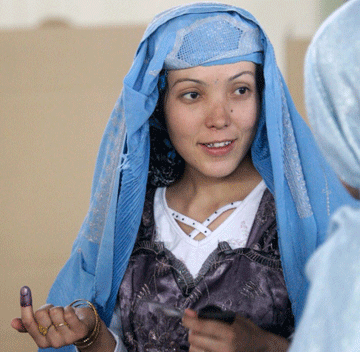
The Meaning of Democracy
by Roya, Afghan Womens’ Writing Project
After the Taliban‘s black regime, when houses were cages for women and only the wild Taliban ideology was law, when the burqa was accepted as a symbol of freedom and the real Islamic hijab disappeared unknown—after all this, Afghan women recognized the word for Democracy.
But Democracy is a very young word for the people of our country, very new in our cultural dictionary, and the question is: Do women understand this word? Do they welcome it, or hide under their burqa?
I think Democracy knocked on the doors of only some women in Kabul, Mazar, Herat, only a few of Afghanistan’s 34 provinces. In most areas, Afghans still don’t know this word. Many think it is a word used only by politicians who travel all over the world, live in the tallest buildings and own the latest car models. Democracy, easiest explanation, is government of the people, for the people. But in our country, people think whatever your heart wants, do it, and that is the meaning of democracy.
In families where women are not allowed to go to the doctor for an illness, their husbands warn: “Don’t think you are free to visit a doctor. Democracy is outside, not here inside my house. I don’t like the doctor to check you, or even anybody to look at you.†Most brothers won’t allow grown sisters to go to school and if you ask them why, the answer is: “We don’t like the Karzai Democracy. My sister is a young woman now and she is responsible for learning how to be a good wife. I don’t like my sister to walk on the streets while people look at her; it breaks my pride. I don’t like Democracy.â€
Not only men misunderstand the word. I visited a woman in prison who killed her husband. She explained: “I didn’t like my husband; he was not my ideal man. When I went to the women’s bakery, I heard I can divorce him. When I told my husband about my decision, he began to fight, and I killed him. I thought no one will question me, because now it is Democracy in our country and women have their rights.â€
In other families, a young son insults his father in front of all his relatives, and demands money from his father. If you ask why, he says: “The answer is obvious, Dad! It is Democracy. I can do anything that I want. I am free.â€
At work, some women wear the newest hairstyle instead of the hijab and you can hardly recognize they are Afghan women, and they say it is their right because of Democracy.
In the market, one shop sells an egg for 5 Afs, another for 10 Afs, and in a third, the price of an egg is 15-20 Afs. Why such different prices? Their answer? “Democracy announced free markets. We can sell as expensive as we want. It is Democracy; it is Democracy.â€
No one is here to tell them: My dear brother, my dear sister, whatever your heart wants is not Democracy. And Democracy is not to blame for your violence and misunderstandings and sorrows; Democracy is not to blame when you won’t let your wife visit a doctor; Democracy can’t tolerate a woman killing her husband because she dislikes him. Democracy doesn’t allow us to misuse freedom of speech; Democracy never told women not to wear their hijabs; it doesn’t select a hairstyle or the color of your clothes.
My dear sister, my dear brother, Democracy is the language of respect; it is voice of real freedom. Democracy means holding your human rights in your hands, having the best economic situation, going to school to study and build a new life and future. Democracy means walking in the successful path of life, with laws under flags of Islam.
My dear brother and sister, Democracy is an unlucky bride in our country, because there are no good examples. It is our strange friend because we don’t know what Democracy is.
We experience Democracy when a man doesn’t beat his wife for not having a son, when a young girl dares to go to school in provinces like Kandahar, Ghazni, and Paktia, when a female doctor works safely in a hospital in an unsecure and remote area, when a woman teaches school in Bamyan, when a sister works in a bank in Kabul, when a mother is a university teacher—and when I take my pen and write, when I am not only an Afghan woman, but an Afghan woman writer.
We need women to participate in policy, economy, and social life. All women should try to stand on their own feet and understand the needs of our poor country, as they understand the feelings and needs of their own children. We need to study the real meaning of Democracy. Put your hands together and stand up to call for a bright tomorrow, call for Democracy. I am sure the world can hear us; I am sure women all over the world can hear us, when we with one voice say: Welcome Democracy… Welcome.